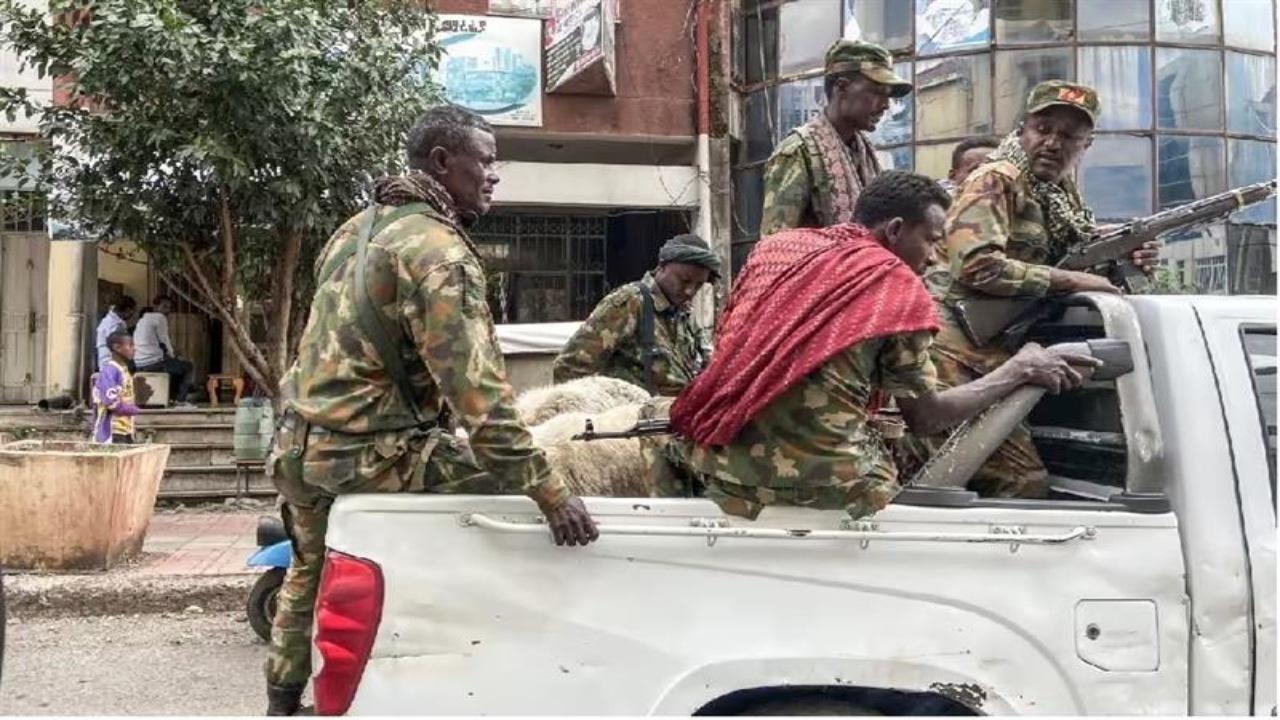Ethiopia's federal government has acknowledged the loss of control over certain districts and towns to militia fighters in the Amhara region, escalating the conflict in Africa's second most populous nation. Residents have reported intense gunfire and military aircraft sightings in various areas.

Members of the Amhara militia, which fight alongside federal and regional forces against the northern region of Tigray, ride on the back of a truck. AFP File photo
Ethiopia's federal government has acknowledged the loss of control over certain districts and towns to militia fighters in the Amhara region, escalating the conflict in Africa's second most populous nation. Residents have reported intense gunfire and military aircraft sightings in various areas.
ADVERTISEMENT
The Amhara region has been under a six-month state of emergency declared by Ethiopia's Cabinet, following clashes and mass protests linked to a plan to integrate regional forces into the military. This effort by the federal government to consolidate security powers has arisen in the aftermath of a two-year-long conflict in the Tigray region. During that conflict, Amhara regional forces and militias played crucial roles as allies to the federal military.
However, residents of the Amhara region, who suffered significantly in the Tigray conflict, accuse the federal government of undermining their region's autonomy. Authorities deny these claims but view the regional fighters as a challenge to constitutional order.
Ethiopia's intelligence chief and the official overseeing the state of emergency, Temesgen Tiruneh, acknowledged that irregular Amhara forces have taken control of towns, released prisoners, and seized government institutions. Temesgen indicated that these forces aim to dismantle the regional government and potentially challenge the federal system.
Reports indicate that Gondar, Lalibela, Debre Birhan, and the regional capital Bahir Dar are experiencing gunfire, while major roads are blocked across the Amhara region. The informal Amhara militia, known as Fano, appears to be in control of Gondar and Lalibela, prominent tourist destinations. Lalibela, previously calm, has been disrupted by gunfire near the airport.
Heavy fighting has been observed in the northern part of Gondar as federal forces attempt to retake the town. Witnesses report military aircraft overhead in Bahir Dar, where the water system has ceased functioning. Tanks have also been seen in the city.
Also read: Beijing releases TV documentary showcasing army's ability to attack Taiwan
Ethiopian Airlines suspended flights to Lalibela, Gondar, and Dessie due to the escalating situation.
US Secretary of State Antony Blinken expressed concern to Ethiopian Prime Minister Abiy Ahmed about the deteriorating security scenario. World Health Organization Director-General Tedros Adhanom Ghebreyesus, an Ethiopian, noted that the violence is impacting humanitarian operations in the Amhara region and called for safeguarding healthcare facilities.
The state of emergency in the Amhara region prohibits gatherings, allows authorities to detain suspects without court orders, impose curfews, and conduct searches. It remains subject to parliamentary approval. The federal government has made arrests to curb illegal armed activities, as per its communication service.
Prominent lawmaker Christian Tadele, a vocal critic of the government and member of the National Movement of Amhara opposition party, was arrested by federal police. This sparked controversy, as Ethiopian law dictates that lawmakers cannot be arrested without parliamentary authorization. (With inputs from AP)
 Subscribe today by clicking the link and stay updated with the latest news!" Click here!
Subscribe today by clicking the link and stay updated with the latest news!" Click here!







